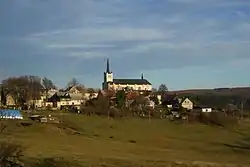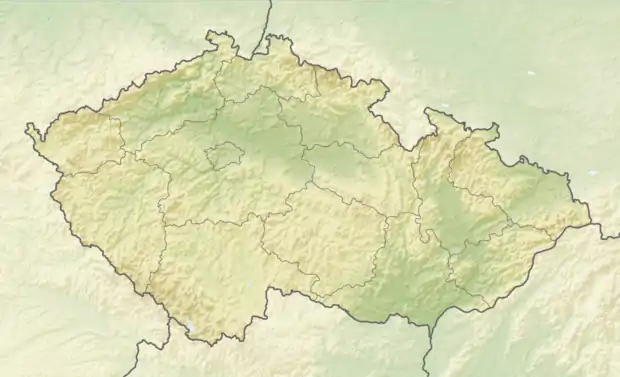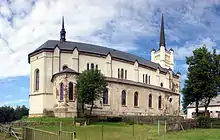Výsluní
Výsluní (earlier also Suniperk; German: Sonnenberg) is a small town in Chomutov District in the Ústí nad Labem Region of the Czech Republic. It has about 400 inhabitants.
Výsluní | |
|---|---|
 General view of the town | |
 Coat of arms | |
 Výsluní Location in the Czech Republic | |
| Coordinates: 50°28′0″N 13°14′15″E | |
| Country | |
| Region | Ústí nad Labem |
| District | Chomutov |
| First mentioned | 1547 |
| Area | |
| • Total | 30.34 km2 (11.71 sq mi) |
| Elevation | 750 m (2,460 ft) |
| Population (2021-01-01)[1] | |
| • Total | 397 |
| • Density | 13/km2 (34/sq mi) |
| Time zone | UTC+1 (CET) |
| • Summer (DST) | UTC+2 (CEST) |
| Postal code | 431 83 |
| Website | www |
Administrative parts
Hamlets of Kýšovice, Sobětice, Třebíška, Úbočí and Volyně are administrative parts of Výsluní.
Geography
The town is located 9 kilometres (6 mi) south of the Reitzenhain border crossing on the ridge of the Ore Mountains.
The Prunéřovský stream flows through the town to the east, which then turns to Kadaň to fall into the Ohře.
History
Výsluní was founded as a mining settlement. Silver, copper, tin and lead ores had been mined in the vicinity of Výsluní since the 14th century. Výsluní itself was founded in the 16th century, the first written mention is from 1547. In 1565, it is referred as a market town, and in 1584, it became a mining town.[2]
Sights

The town is known for the Church of Saint Wenceslaus, the largest church in the Upper Ore Mountains, popularly known as the Ore Mountains Cathedral.[3] It dominates the town and is visible on the southern slope of the mountains far into the North Bohemian Basin.[2]
The town hall is an Empire style building from 1846.[2]
In popular culture
The town's church appeared in many film works: The Borgias, Henri 4, Year of the Devil, Forgotten Light, Thirty Cases of Major Zeman, and Feuer frei! music video.[3]
Notable people
- Anton Tausche (1838–1898), German Bohemian politician, honorary citizen of Výsluní[4]
References
- "Population of Municipalities – 1 January 2021". Czech Statistical Office. 2021-04-30.
- "Historie" (in Czech). Město Výsluní. Retrieved 2021-07-11.
- "Výsluňský kostel zachraňoval farář Bolka Polívky, duněli tu i Rammstein" (in Czech). iDnes. 2016-07-11. Retrieved 2021-07-11.
- Constant von Wurzbach (1881). Biographical Dictionary of the Empire, Austria (Biographisches Lexikon des Kaiserthums Oesterreich), 43. Band, Wien 1881, S. 140 f.